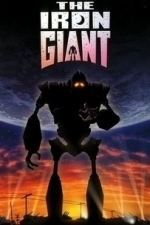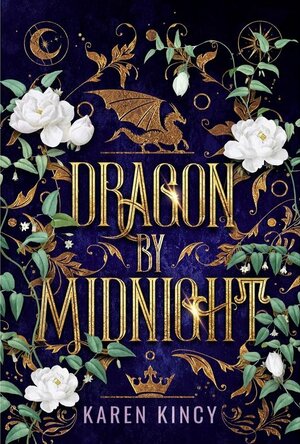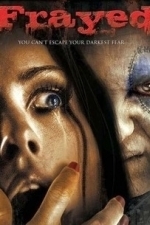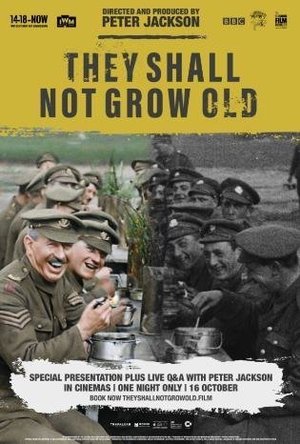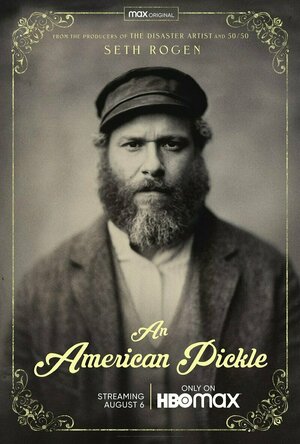
Sprout Pregnancy
Health & Fitness and Medical
App
Congratulations on your pregnancy and welcome to Sprout! It’s an Apple ‘Essential App for...
BankofMarquis (1832 KP) rated The Iron Giant (1999) in Movies
Jun 14, 2020
And that is too bad...for the film that was released - THE IRON GIANT - is a wonderfully warm and heartwarming tale of friendship, acceptance and, yes, intolerance of those different from you, set against the backdrop of the Cold War of the 1950's.
Marking the full length feature animation Directing debut by Brad Bird (THE INCREDIBLES), THE IRON GIANT tells the tale of young Hogarth, who finds a...well...Iron Giant... who has fallen to Earth from Outer Space. Hogarth befriends The Iron Giant and helps to hide him from Military-types who see this as a threat to the safety, security and superiority of the United States.
Featuring the vocal talents of Jennifer Aniston, John Mahoney, Harry Connick, Jr., Christopher McDonald and Eli Marienthal (as Hogarth), this film is warm and inviting, showing "good characters" that you want to root for and spend time with spar with "bad guys" that you want to see defeated. All of this over a character that is naive to what is going on around him. Special notice should be made of Vin Diesel's vocal work as The Iron Giant. He says very few things, but the words that he does say, convey strong emotions.
You can see the seeds of THE INCREDIBLES in this work of Director Bird. The action sequences are fun and effective and are off-set by slower, more personal, scenes of the characters getting to know - and interact with - each other. He shows a deft touch in balancing these items, finding the right amount of pathos and pace throughout.
The main themes in this film - fearing that which you do not know/do not care to understand resonates to this day and is a reminder that kindness can go much further than fear/ignorance/intolerance.
Letter Grade: A-
8 stars (out of 10) and you can take that to the Bank(ofMarquis)
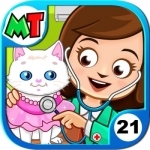
My Town : Pets
Games and Education
App
*** Pay once & Play forever + receive FREE updates! No ads and no IAP *** If you have a pet or are...
Lottie disney bookworm (1056 KP) rated Dragon By Midnight in Books
Aug 30, 2021
Karen Kincy had some bestseller-worthy ideas when it came to this book: I loved Sikandar's mysterious sorcerer vibe and dark past; the Jinni gave Arabian nights/Aladdin vibes and the plot twist of the curse was brilliant.
However, in my opinion, the major elements that made Dragon by Midnight great were just not developed enough and I was left with unanswered questions, in particular with Cinderella's story line.
Sikandar is bound to be everyone's favourite character and the description of him as a cinnamon roll hero is perfect. I would have liked him to keep his mystery for a bit longer and for the worthiness of his previous actions to be withheld instead of instantly revealed - it felt like he was a mysterious murderer one second and then an amazing hero the next . Although this was in keeping with the fast-paced nature of the story.
Similarly, the romance between Sikandar and Cinderella developed so quickly. She almost fell in love with him straight away! It was also very fluffy and cute: which is not a criticism! This is a YA book after all. However, sometimes Cinderella seemed too wrapped up in the cute boy and less concerned about ... well, being a dragon!
Prince Benedict Charming was brilliant in his arrogance and cringe worthiness. I did expect a bit more action and dragon-hunting from him though and his attitude towards Cinderella when she returned to the castle as a girl was very odd. I truly couldn't tell if he was so self-absorbed he didn't care what had happened, or if he was plotting something.
Overall I did enjoy Dragon by Midnight and read it within a day. It is a very cute, fast-paced fairytale with some genius ideas. The overly descriptive language and lack of character development would push it closer to the middle-grade side of YA for me but I enjoyed the story and will possibly pick up the sequel if I see it.
I received an advance review copy for free, and I am leaving this review voluntarily.
Gareth von Kallenbach (980 KP) rated Frayed (2007) in Movies
Aug 14, 2019
Sadly in such a competitive field, many struggle to be given that shot, and never get a chance to see their dreams reach fruition. Thanks to Screamfest, (www.screamfest.com) independent horror film makers are given their chance to submit their works to be included in an annual competition.
The competition screens films for fans and judges, and awards prizes to the top films of the competition. This is ideal for filmmakers as not only do they get publicity and an audience for their work, but a chance at a distribution deal and future work.
This year a local Washington State based company (lock It Entertainment) called has seen the culmination of years of work realized as their film “Frayed” has been accepted into the competition and stands out as one of the most promising films of the competition.
The film is set in a small town in Washington State where a small boy named Kurt brutally kills his mother and is confined to a mental institution. It is learned that Kurt is trapped in his mind and that he may not ever be able to return to normalcy.
The film then moves to the present day where Kurt is scheduled to be transferred to a facility that is better suited to his condition, as he has grown beyond any help. His father, the local Sheriff, Pat Baker, (Tony Doupe’), is struggling with the decision as he knows that it is the right thing to do, but finds it hard to sign his son away to the care of another institution.
At home, Sheriff Baker returns to find his daughter Sara (Alena Dashiell), on her way to a camping trip and his new wife Jolene (Kellee Bradley) frustrated over the boundaries that Sara and her friends have.
As if his day could not get any worse, Sheriff Baker learns that Kurt has escaped during his move, and is leaving a trail of carnage in his wake.
Torn between his loyalty to his son and his duty to protect the community, Sheriff Baker mounts a manhunt to capture Kurt unaware that a security officer from the hospital named Gary (Aaron Blakely), is in hot pursuit of Kurt and is witness to his deadly brutality firsthand.
What follows is a tension filled race against time where all of the central characters are caught up in an intertwining web of terror.
The film is surprisingly effective as at first I thought I was in for a “Halloween” style film of the psycho killer on the loose. Instead the film cleverly mixes the slasher film genre with ample amounts of drama and psychological drama.
Norb Caoili and Rob Portmann who co-wrote, co-directed, and co-produced the film along with Executive Producer and co-writer KurtSvennungsen, have made an entertaining film that packs plenty of horror staples along with some effective twists and turns that makes “Frayed” a surprisingly original and effective thriller.

iGym PRO - Gym Workout Log. Exercise journal, bodybuilding & fitness routines for bulking & cutting, abs carving. Body measurements diary. Weight loss & mass tracker.
Health & Fitness and Lifestyle
App
The very best, handy and simple gym assistant! Experience the new level of working out with iGym! -...
Bob Mann (459 KP) rated They Shall Not Grow Old (2018) in Movies
Sep 28, 2021
The results are outstanding. Jackson wisely focuses the film on the specific slice of WW1 action from the trenches. And those anonymous figures become real, live, breathing humans on screen. It is obviously tragic that some (and as commented by Jackson, many in one scene) are not to be breathing humans for much longer.
These effects take a while to kick in. The early scenes in the documentary are in the original black and white, describing the recruitment process, and how many of the recruits were under-age. (To explain the varied comments in the film, they should have been 18, although officially shouldn’t have been sent overseas until 19).
It is when the troops arrive in France that we suddenly go from black-and-white to the fully restored and colourised footage, and it is a gasp-inducing moment.
Audio magic
All of the audio commentary is from original BBC recordings of war veterans recounting their actual experiences in the trench. Some sound like heroes; some sound like rogues; all came out changed men. Supporting music of WW1 ditties, including the incredibly rude “Mademoiselle from Armentières” over the end credits, is provided by Plan 9.
But equally impressive is the dubbing of the characters onscreen. Jackson employed forensic lip-readers to determine what the soldiers on-screen were saying, and reproduced the speech using appropriate regional accents for the regiments concerned. Jackson also recounts how the words associated with a “pep-talk” speech to troops by an officer he found on an original slip of paper within the regimental records: outstanding. Added sound effects include real-life shelling by the New Zealand army. It all adds to the overall atmosphere of the film.
3D = less
The film itself is a masterpiece of technical innovation that will change in the future the way in which we should be able to see this sort of early film footage forever. As a documentary it’s near-perfection. But if I have a criticism of the cinema showing I attended it is that the 3D tended to detract rather than add to the film. Perhaps this is just my eyesight, but 3D always tends to make images slightly more blurry. Where (like “Gravity”) there are great 3D effects to showcase, it’s worth the slight negative to get the massive positive. But here, there was no such benefit: 2D would have been better. For those in the UK (and possibly through other broadcasters worldwide) the film is being shown on BBC2 tonight (11/11/18) at 9:30: I will be watching it again to compare and contrast.
Final Thoughts
Jackson dedicated the film to his grandfather. And almost all of us Brits will have relatives affected by this “war to end all wars”. In my case, my grandfather was shot and severely wounded at Leuze Wood on the Somme, lying in the mud for four days and four nights before being recovered… by the Germans! Fortunately he was well-treated and, although dying young, recovered enough to father my father – else I wouldn’t be here today writing this. On this Rememberance Sunday, 100 years on, it is a time for us to truly remember the sacrifice these men and boys gave to what, all in the film agree, was a pretty obstinate and pointless conflict.
I’ll finish the review by reproducing one of the war poems of my wife’s Uncle Ivor (available in a collection here), written on 11/11/18 a hundred years ago:
Peace
At last O Lord the Day has come,
And hushed is now the noise of guns.
Peace is proclaimed over land and sea,
Our heartfelt thanks we give to Thee.
I thank thee Father for Thy care,
That thou hasn’t answered all my prayers.
This day I see in manhood’s strength,
The Peace we longed for, come at length.
O may my future actions be,
Worthy of all Thy care to me.
Let me forget not Thy Great Love,
Remembering chums who live Above.
I.G.H. 11/11/1918, France.

PhotoMemes
Lifestyle and Photo & Video
App
PhotoMemes gives all your photos a new life: organized automatically into beautifully designed theme...

Natural Cycles, Birth Control
Health & Fitness and Medical
App
Natural Cycles helps you keep track of your ovulation, period and fertility. The app will show you...
Lee (2222 KP) rated An American Pickle (2020) in Movies
Sep 2, 2020
It’s 1919. Herschel Greenbaum leads a simple life, working as a ditch-digger in Eastern European village Schlupsk – a tough job, that results in many broken shovels. One day though, his luck changes when he meets Sarah, and they fall in love. They have so much in common – his parents were murdered by Cossacks, her parents were murdered by Cossacks, not to mention the fact that they both like black! But when those pesky Cossacks ravage the village on their wedding day, Herschel and Sarah decide to set sail for America, with plans for a new life in the land of opportunity. Settling in Brooklyn, Herschel still has pretty simple life goals, wanting one day to be able to experience the luxury of seltzer water (“I want the bubbles to tickle my tongue”). But he and his now pregnant wife vow that in 100 years time, the Greenbaum name will actually mean something.
Herschel lands himself a slightly better job than ditch-digger – chasing and killing rats in a pickle factory! But an unfortunate accident sees Herschel falling into a large vat of pickles, right at the very moment that the factory gets condemned and shut down. The lid is placed on the vat and the workers quickly abandon the factory, leaving Herschel perfectly preserved in the brine. 100 years pass, and the city develops around the factory, which miraculously seems to remain untouched until 2019, when a couple of kids venture inside and remove the lid of the vat, releasing Herschel from his hibernation.
The science behind how this perfect preservation was possible is hilariously glossed over, and when his only living relative is discovered, Herschel is released into his care. Great-grandson Ben (also played by Rogen) is an app developer residing in Brooklyn, and with no living family is overjoyed at the opportunity to take Herschel back to his apartment and begin introducing him to the future.
Ben has a SodaStream, so finally being able to enjoy the tickling bubbles of seltzer water is already a highlight for Herschel. Ben also owns 25 pairs of socks, which is amazing as he only has two feet! But it’s not long before Herschel begins to question why Ben doesn’t have any family photos up in his apartment and why the mobile app that Ben has been working so hard on for the last five years hasn’t really taken off. After discovering that the plot of land where his wife Sarah is buried sits right beneath a billboard advertising vodka (“Cossack vodka!”), Herschel becomes determined to raise the $200,000 needed to buy the plot of land so that he can remove the billboard.
The trailer for An American Pickle gave the impression that, despite the obvious wackiness of the plot, there was evidence of a strong family movie at the heart – a touching representation of what it would mean to be able to spend some time with one of your ancestors. There are certainly elements of that here, early on and in the latter parts of the movie. However, with their differing approaches to family values and attitudes to business, the pair soon fall out, and there is a lengthy period of bickering and backstabbing, which eventually becomes tiresome. Herschel starts setting up his own pickle business from scratch, while a jealous Ben does his very best to ruin everything. It’s a noticeable lack of focus that ultimately lets the movie down.
Despite that, it’s wonderful to see Seth Rogen in such different roles. I’m not usually a fan of his, bored of his usual stoner shtick in almost every movie he’s in. But I really enjoyed his performances in this, especially as the thickly accented Herschel, and his interactions with Ben are both charming and wonderful at times.
